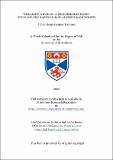"t̶h̶e̶ ̶l̶i̶g̶h̶t̶ ̶t̶o̶u̶c̶h̶ ̶o̶f̶ ̶a̶ ̶v̶e̶r̶y̶ ̶f̶r̶i̶e̶n̶d̶l̶y̶ ̶h̶a̶n̶d̶" : style and the haptic in Jane Austen's manuscripts
Abstract
This thesis focuses on Jane Austen’s surviving manuscripts: those of her extant letters, of her early fiction, gathered in three handmade books (commonly called ‘juvenilia’), of her later fiction, unpublished during her lifetime (commonly called ‘later manuscripts’), and the early draft of two chapters of Persuasion. These autograph manuscripts, because they have not passed through a full editorial process, display Jane Austen’s writing in its earliest stages, and permit an analysis of her writing process, and the development of her style.
After a survey of the scientific, philosophical and literary texts that informed the understanding of Austen’s time, this thesis analyses occurrences of touch and the haptic in these writings, and argues that they are central to understanding her narrative and stylistic choices. Touch was an important element of her early writings and personal letters, which Austen gradually toned down in her fiction and correspondence, but which resurfaces in her final works, Persuasion and ‘Sanditon’. Early drafts usually contain numerous haptic events, which are erased or minimised in revisions and corrections. The reader needs to infer these deletions in order fully to understand Austen’s prose.
This thesis argues that references to the haptic are essential to understanding Austen’s prose, because they are part of her writerly instinct, but only remain present in final drafts at critical moments, when they attain most narrative focus. It also argues that tactile and haptic instances inform Austen’s very style. The grammatical, semantic and figural structures that Jane Austen uses call on ambiguity and syntagmatic suspense, which elicit in the reader a physical reaction akin to touch. Austen’s style effects a mental dissonance or friction that stems from the seemingly irreconcilable elements she conjoins; these sensations are an integral part of the pleasure of the ideal reader, who is invited to be a participant in Jane Austen’s creative process.
Type
Thesis, PhD Doctor of Philosophy
Collections
Items in the St Andrews Research Repository are protected by copyright, with all rights reserved, unless otherwise indicated.

